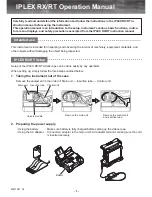
VTI Instruments Corp.
66
EX1200A Series Basic Mainframe Operation
When enabled as an output, each channel also has the ability to generate a 1 µs pulse upon
command. An example application of this pulse is to use the EX1200A to externally trigger
another piece of test equipment. The specific operation of the pulse depends on the static level
programmed for that channel. When a channel is programmed with a static level of high, the pulse
will be low-going. When a channel is programmed with a static level of low, the pulse will be
high-going. Each pulse generation requires a separate function call.
For expanded and more automated operation, each DIO channel can be independently linked to
any of the EX
1200’s backplane trigger lines, allowing any trigger condition (such as an over
-limit,
or measurement complete event) that can be asserted by a plugin-module or the integrated DMM
on those backplane lines to be exported to any of the DIO channels.
one or multiple limit conditions on one or more input channels. This is termed a DIO Limit Event.
For example, DIO channel 0 can be programmed to go high when the upper limit of set 0 for
channel 2 or the lower limit of set 1 for channel 1 is exceeded. When linked as a limit event, a
DIO channel will be cleared at the beginning of a new acquisition. Its state will then be updated
with each scan according to the programmed limit evaluations. By default, the cleared state is low,
but can be set on a per channel basis to be high through the use of the Invert setting. Similarly, the
default operation of each channel is non-latch mode, but can be set on a per channel basis to be
latch mode. In latch mode, a transition out of the cleared state would remain, regardless of future
limit evaluations, until it is cleared at the beginning of a new acquisition.
It is important to note that the control of the DIO channels through DIO Limit Event assignment
does not lock out control through the direct output mechanism. For example, even if a DIO
channel has been set high by a DIO Limit Event, it could be asynchronously set low through direct
output control. Because limits can only be evaluated as fast as data is being acquired, there could
be an application that employs a slow sampling rate but requires the DIO channel to be reset
sooner than the normal limit evaluation mechanism would do it. The direct DIO control provides
this capability. Use of that control does not alter or disable the limit event mechanism controls; it
simply asynchronously alters the level of the DIO channel output. Upon the next scan (and
subsequent limit evaluation), the DIO channel will be updated normally per its DIO Limit Event
configuration. In general, however, an application will employ only one control mechanism. For
that reason, if a DIO channel is linked as a DIO Limit Event, this is noted in the direct control
mechanism as a pseudo-warning to guard against accidental use.
The default selections for each DIO channel are:
output enable is off
output level is 0
The default selections for DIO Limit Events are:
all channels are disabled
invert is off
latch is off
Summary of Contents for Ametek EX1200A Series
Page 33: ......
Page 51: ...VTI Instruments Corp 50 EX1200A Series Preparation for Use ...
Page 64: ...www vtiinstruments com EX1200A Series Preparation for Use 63 ...
Page 65: ......
Page 73: ......
Page 107: ...VTI Instruments Corp 106 EX1200A Triggering ...
Page 109: ...VTI Instruments Corp 108 EX1200A Triggering FIGURE 6 1 EX1200A SERIES TRIGGER MODEL ...
Page 143: ...VTI Instruments Corp 142 EX1200A Web Page Operation ...
Page 145: ...VTI Instruments Corp 144 EX1200A Series Programming ...
Page 155: ......
Page 161: ......
















































